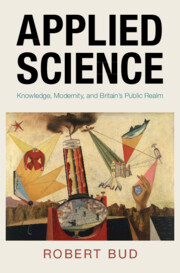Book contents
- Applied Science
- Science in History
- Applied Science
- Copyright page
- Dedication
- Contents
- Figures
- Acknowledgements
- Introduction
- Stage 1 Origins and Pedagogy in the Nineteenth Century
- 1 Applied Science Conceived
- 2 Applied Science Institutionalised
- 3 Competing Concepts of Applied Science and Technology
- Stage 2 Research in the Early Twentieth Century
- Stage 3 After World War Two
- Archives Used
- References
- Index
2 - Applied Science Institutionalised
The Liberal Science College
from Stage 1 - Origins and Pedagogy in the Nineteenth Century
Published online by Cambridge University Press: 15 March 2024
- Applied Science
- Science in History
- Applied Science
- Copyright page
- Dedication
- Contents
- Figures
- Acknowledgements
- Introduction
- Stage 1 Origins and Pedagogy in the Nineteenth Century
- 1 Applied Science Conceived
- 2 Applied Science Institutionalised
- 3 Competing Concepts of Applied Science and Technology
- Stage 2 Research in the Early Twentieth Century
- Stage 3 After World War Two
- Archives Used
- References
- Index
Summary
The rich diversity of industrial achievements at the Great Exhibition of 1851 stimulated debate about the factors making such developments abundant in the modern age. Campaigners for science education pointed to the superiority of international competitors, to the roots of relative decline, means of mitigation through their favourite measures, and the importance of new institutions – such as those promoting knowledge of applied science, foregrounding the term. The wish to emulate France led to new bodies, such as the government’s Department of Science and Art, which paid teachers across the land and ran examinations, and Birmingham’s private Mason College; to the substantial development of Manchester’s Owens College; and to widespread public debate. In Parliament, Bernhard Samuelson further popularised the term ‘applied science’, promoting and obtaining an enquiry into its teaching. Though Thomas Huxley famously condemned the term at the 1880 opening of Mason College, the donor’s spokesman warned that we should credit it for Mason’s philanthropy.
Keywords
- Type
- Chapter
- Information
- Applied ScienceKnowledge, Modernity, and Britain's Public Realm, pp. 44 - 65Publisher: Cambridge University PressPrint publication year: 2024

